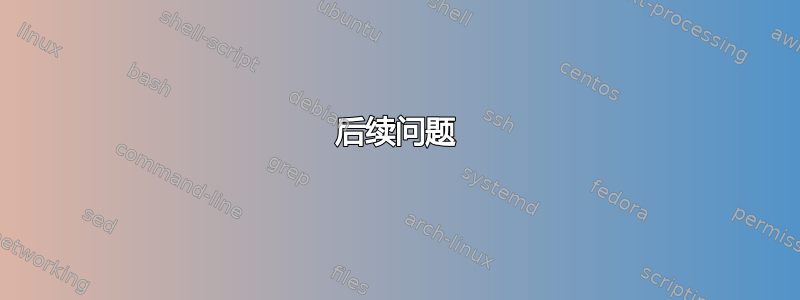
我想在左对齐排版段落的每一行开头添加一个随机空格。这个想法是为了模拟手写手稿。
我以为我可以使用 trick lineno 包来做到这一点,但这不是逻辑。欢迎任何想法。
后续问题
Sašo Živanović 的解决方案有效,但在类似的背景下,它与之前定义的宏相冲突:段落形状保持正常。
% Based on some ideas from http://tex.stackexchange.com/a/29458
\documentclass{article}
% thanks to Bruno Le Floch
\usepackage{rotating}
\usepackage[first=-3,last=5]{lcg}% you can play around with these values
\makeatletter
\newcommand{\globalrand}{\rand\global\cr@nd\cr@nd}
\makeatother
\newcommand{\randomrotation}[1]{\globalrand\turnbox{\value{rand}}{#1}\phantom{#1}}
% thanks...
\makeatletter
\def\handmove#1{%
\@handmove#1 \@empty }
\def\@handmove#1 #2{%
\randomrotation{#1}\space
\ifx #2\@empty
\else
\expandafter\@handmove
\fi
#2%
}
\makeatother
%la macro de Saso Zivanovic
\usepackage{pgf,pgffor}
\usepackage{etoolbox}
\def\randomflushleftpercent{0.3}
\def\randomflushleftn{42}
\newenvironment{randomflushleft}{%
\raggedright
\everypar={\computerandomparshape}
}{}
\def\computerandomparshape{%
\gdef\myparshape{\parshape\randomflushleftn\space}%
\foreach \n in {1,2,...,\randomflushleftn} {%
\pgfmathparse{rnd*\randomflushleftpercent*\textwidth}%
\xappto\myparshape{\pgfmathresult pt }%
\pgfmathparse{\textwidth-\pgfmathresult}%
\xappto\myparshape{\pgfmathresult pt }%
}%
\myparshape
}
\begin{document}
\pagestyle{empty}
\begin{randomflushleft}
\handmove{Solacia dua, nequaquam paria tanto dolori, solacia
tamen. Solacia dua, nequaquam paria tanto dolori, solacia
tamen. Solacia dua, nequaquam paria tanto dolori, solacia
tamen.}
\end{randomflushleft}
\end{document}

答案1
正如大卫所建议的...随机生成\parshape。
42 应该足够大。\randomflushleftpercent确定左侧空白的最大量(以文本宽度的百分比表示)。
\documentclass{article}
\usepackage{lipsum}
\usepackage{pgf,pgffor}
\usepackage{etoolbox}
\def\randomflushleftpercent{0.1}
\def\randomflushleftn{42}
\newenvironment{randomflushleft}{%
\raggedright
\everypar={\computerandomparshape}
}{}
\def\computerandomparshape{%
\gdef\myparshape{\parshape\randomflushleftn\space}%
\foreach \n in {1,2,...,\randomflushleftn} {%
\pgfmathparse{rnd*\randomflushleftpercent*\textwidth}%
\xappto\myparshape{\pgfmathresult pt }%
\pgfmathparse{\textwidth-\pgfmathresult}%
\xappto\myparshape{\pgfmathresult pt }%
}%
\myparshape
}
\begin{document}
\parskip 1ex
\begin{randomflushleft}
\lipsum
\end{randomflushleft}
\end{document}
回答后续问题
\parshape在-setting within\everypar和 引入的组之间存在(不幸的)交互\handmove。\everypar标记在段落进入水平模式之前插入。当\handmove{...}是段落中的第一件事时,\everypar因此在由 开启的组中调用\turnbox。该组在段落结束前关闭,导致集合\parshape被遗忘。解决方案:\handmove以 开头\mbox{}。
环境末尾也出现了类似情况randomflushleft。段落尚未结束,但由 引入的组randomflushleft已关闭。解决方案:randomflushleft以显式结尾\par。
\documentclass[draft]{article}
\usepackage[utf8x]{inputenc}
\usepackage{lipsum}
% thanks to Bruno Le Floch
\usepackage{rotating}
\usepackage[first=-3,last=5]{lcg}% you can play around with these values
\makeatletter
\newcommand{\globalrand}{\rand\global\cr@nd\cr@nd}
\makeatother
\newcommand{\randomrotation}[1]{\globalrand\turnbox{\value{rand}}{#1}\phantom{#1}}
% thanks...
\makeatletter
\def\handmove#1{%
\mbox{}\@handmove#1 \@empty }
\def\@handmove#1 #2{%
\randomrotation{#1}\space
\ifx #2\@empty
\else
\expandafter\@handmove
\fi
#2%
}
\makeatother
%la macro de Saso Zivanovic
\usepackage{pgf,pgffor}
\usepackage{etoolbox}
\def\randomflushleftpercent{0.3}
\def\randomflushleftn{42}
\makeatletter
\newenvironment{randomflushleft}{%
\everypar={\randomparshape}%
\raggedright
\rightskip \z@ plus2em
}{\par}
\makeatother
\def\randomparshape{%
\xdef\myparshape{\noexpand\parshape\randomflushleftn\space}%
\foreach \n in {1,2,...,\randomflushleftn} {%
\pgfmathparse{rnd*\randomflushleftpercent*\textwidth}%
\xappto\myparshape{\pgfmathresult pt
\the\dimexpr\textwidth-\pgfmathresult pt\relax\space}%
}%
\myparshape
}
\begin{document}
\pagestyle{empty}
\parskip 2ex
\begin{randomflushleft}
\handmove{Solacia dua, nequaquam paria tanto dolori, solacia
tamen. Solacia dua, nequaquam paria tanto dolori, solacia
tamen. Solacia dua, nequaquam paria tanto dolori, solacia
tamen.}
\end{randomflushleft}
\end{document}

代码中还有一些进一步的更改,大多数只是美化,但其中一项非常重要:如果没有 的\rightskip \z@ plus2em定义randomflushleft,第一行可能会结束得太早。我发现这是一个非常有趣的现象:我发布了一个问题关于它。
答案2

\documentclass{article}
\textwidth.3\textwidth
\begin{document}
\def\a{One two three four five six seven eight nine ten. }
\def\b{\a\a\a Red green blue yellow white black. \a}
\def\p#1{#1 \dimexpr\textwidth-#1\relax}
\raggedright
\itshape
\parshape 20
\p{1pt}\p{3pt}\p{1pt}\p{2pt}\p{3pt}
\p{2pt}\p{1pt}\p{4pt}\p{1pt}\p{3pt}
\p{1pt}\p{3pt}\p{5pt}\p{2pt}\p{1pt}
\p{3pt}\p{2pt}\p{3pt}\p{1pt}\p{2pt}
\b
\end{document}
这里我只是编造了偏移量的“随机”列表,但你可以根据需要使用随机数生成器(来自 pgfmath 或您选择的任何数字)来生成该列表


